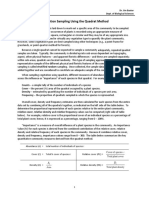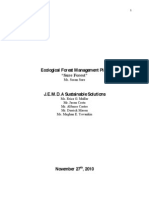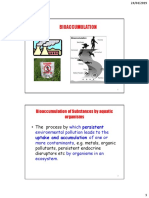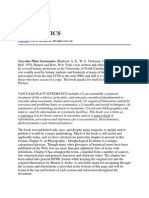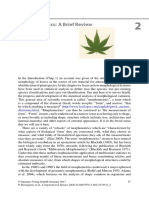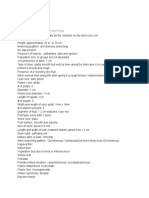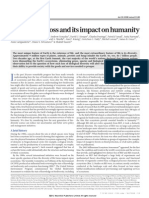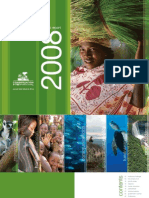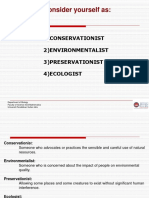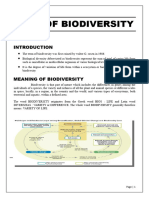Glossary of Ecology
Glossary of Ecology
Uploaded by
mendebourCopyright:
Available Formats
Glossary of Ecology
Glossary of Ecology
Uploaded by
mendebourCopyright
Available Formats
Share this document
Did you find this document useful?
Is this content inappropriate?
Copyright:
Available Formats
Glossary of Ecology
Glossary of Ecology
Uploaded by
mendebourCopyright:
Available Formats
From Wikipedia, the free encyclopedia
Glossary of ecology
Glossary of ecology
This is a list of ecology topics. It relates to the science of ecology which is the study of the interactions between various species and their natural environment. Animal Behavior - studied in ethology & zoology. the desire to understand animals and their use of communication, emotions, sex, and other behaviors. Applied ecology - the practice of employing ecological principles and understanding to solve real world problems (includes agroecology and conservation biology) area effect (island biodiversity) - the hypothesis that larger islands can support more species than smaller islands atmosphere- earths atmosphere is comprised of gasses and water that are retained by earths gravity and help the earth retain heat and reflect UV radiation. autecology autopoesis autotroph - an organism who makes its own food from inorganic materials.
A
adaptive behavior - In behavioral ecology, this is any behavior which contributes to an individuals reproductive success and is thus subject to the forces of natural selection. Adaptive management A systematic process for continually improving management policies and practices by learning from the outcomes of operational programs adoption - when an organism permanently assumes the role of parent towards a juvenile individual which is not its offspring. aerobic metabolism - the process of cellular respiration that occur in the presence of oxygen age structure- the distribution of various age groups in a population (typically that of a country or region of the world), which normally forms the shape of a pyramid. agroecology the science of applying ecological concepts and principles to the design, development, and management of agricultural environments agroecosystem an assembly of mutually interacting organisms and their environment in which materials related to crop production are interchanged in a largely cyclical manner allee effect- a biology-related concept that is characterized by the relationship between the size of the population and the growth rate of the species. altruistic behavior- behavior in which the subject shows less of a concern for their own well being and more for the welfare of others or offspring. anaerobic metabolism- the fermentation of organic compounds in which air is not breathed in. Contrary to aerobic respiration which needs oxygen to be carried out.
B
bacteria Behavioral ecology - studies the ecological and evolutionary basis for animal behavior, focusing largely at the level of the individual biodegradable - capable of decaying through the action of living organisms biodiversity - diversity among and within plant and animal species in an environment Biogeochemistry - effect of biota on global chemistry, and the cycles of matter and energy that transport the Earths chemical components in time and space biogeochemical cycle - the pathway through which a chemical, element, or molecule moves through the atmosphere, hydrosphere, lithosphere, and biosphere. Biogeography - the study of the geographic distributions of species bioinvader - non-native species biomass -the sum of all living living organisms in an area. biomass pyramid - also called a ecological pyramid, it is a graph that illustrates the productivity in a trophic level.
From Wikipedia, the free encyclopedia
biome - The total complex of biotic communities occupying and characterizing a particular area or zone biosphere - the sphere of life; all living matter of the planet occupied by life biogeographic realm - is the largest scale of the Earths surface based on the distribution patterns of plants and animals. biogeography - the study of the distribution of organisms, past and present, and of diverse processes that underlie their distribution patterns biological magnification-the increase in concentration of a substance Biota - the total collection of organisms of a geographic region or a time period. biotic potential - under ideal conditions, the maximum rate of increase of a population in a given area. boreal forest- forest areas of the northern North Temperate Zone, mostly made of coniferous trees, also known as taiga.
Glossary of ecology
climate change - change in weather conditions such as cloud cover wind speed, temperature , rainfall or humidity in a specific region. cohert - an individual in a population that is of the same species climax community - a biological community of plants and animals that has reached a constant state occurring when the species is best adapted to average conditions in that area climax-pattern model - a community is adapted to many environmental factors that vary in their influence over a region conservation biology- scientific study of the earths biodiversity and aimed at protecting habitats and species from extinction. Conservation ecology - which studies how to reduce the risk of species extinction commensalism- A symbiotic relationship between two organisms of different species in which one attains some benefits while the other is unaffected communication display - a pattern of behavior that is a social signal, sending others a message through different displays of movement, and voice Communication Signal- instinctive and learned behaviors by which animals send and receive to each other in information laden cues, encoded in stimuli. community - a group of various organisms living in the same environment community assembly theory-explains how environmentally similar sites have different species or similar species because of the resources they need or "niche requirements" Community ecology (or synecology) studies the interactions between species within an ecological community consumer -an organism, usually an animal, that feeds on plants or other animals. competition - when organisms from the same or different species compete against each other for food, better living conditions, better reproductive success, or any limited resouce where the most fit or most adapted individual comes out on top and thus survives and reproduces competitive exclusion principle- States that two species can not both exist if they are competing for the exact same resource. Therefore there is always one with a small advantage that will cause the
C
community structure- a series of close knit groups that share common characteristics, they form a spider web pattern because of the natural divisions in the structure of the community. camouflage - used to deceive or disguise from surroundings carbon cycle - is the biogeochemical cycle by which carbon is exchanged among the biosphere, pedosphere, geosphere, hydrosphere, and atmosphere of the Earth. carrying capacity - the maximum number of individuals an environments resources can support, including the food and water available for the environment Charismatic megafauna - a species of large animal species with widespread popular appeal that environmental activists use to achieve conservation goals well beyond just those species. Examples include the Giant Panda, the Bengal Tiger, and the Blue Whale. See Flagship species. Chemical ecology - which deals with the ecological role of biological chemicals used in a wide range of areas including defense against predators and attraction of mates climate - The long term average weather pattern in a particular place.
From Wikipedia, the free encyclopedia
other species in most cases to become extinct. composite signal - a signal used in order to communicate which has information within more than a single cue. coniferous forest - is a land biome, or large section of land cooperation -is the process of working or acting together, intentionally or not. It encompasses working in harmony, side by side, while also involving something as complex as the inner workings of a human being or even the social patterns of a nation. Courtship Display- Ritual social behavior between possible mates
Glossary of ecology
detrital food web - a food web depicting energy flow from photoautotrophs through detrivores and decomposers detrivores-heterotrophs which consume decomposing bits of organic matter, such as leaf litter. decomposers - organisms that breakdown substances into simpler substances distance effect (island biogeography) - the uniques assemblage of life form and species on an island dry woodland- a type of biome that forms when rainfall is averaging around 40 to 100 centimeters, and also has many tall trees dominance hierarchy - organization of individuals into groups with a social structure. Dominance species - a species which characterizes and predominates an ecological community as measured by primary productivity or biomass. doubling time - the amount of time it a population takes to double its size.
D
deciduous broadleaf forest - a forest in a more mild climate with dry seasons, where the trees foliage changes with the varying seasons. Decomposition- process by which tissues of dead organisms break down to more simplistic forms of mater and organic matterial, freeing up the limited space in the biome density-dependent control -any factors that affect individuals of a population and that vary with population density. Desert ecology- The sum of the interactions between both biotic and abiotic factors of the desert biomes. including the interactions of plant, animal, and bacterial populations in a desert community. desert - a landscape that receives less than 10 inches of rain per year desertification - a process by which areas become desertlike wastelands with low biodiversity Demographics - the characteristics of human populations for purposes of social studies. demographic transition model-a model, which represents a shift from high to low birth rates and death rates as part of the economic development of a country Denitrification - The breakdown of nitrates by anaerobic bacteria into other forms. Generally soil. density independent factor- A factor that affects the size of a population regardless of the population density.
E
ecology- The study of interactions between organisms and their environment ecological literacy- is the ability to understand the natural systems that make life on earth possible ecological selection- ecological processes that operate on a species inherited traits without reference to mating or secondary sex characteristic. Ecological succession - a focus on the understanding that directs vegetation change ecophagy - the consuming of an ecosystem Ecophysiology - which studies the interaction of physiological traits with the abiotic environment ecopoiesis - fabrication of a sustainable ecosystem on a currently lifeless, sterile planet ecoregion - a region defined by its geography and ecology ecosynthesis ecosystem - the total of interacting organisms (biocoenosis) and non-living things (biotope) in a specific environment Ecosystem ecology - which studies how flows of energy and matter interact with biotic elements of ecosystems ecosystem function
From Wikipedia, the free encyclopedia
ecosystem modeling- The use of math, computer programs and models to foreshadow unanticipated problems of the ecosystem Ecosystem services-Resources and processes that are supplied in a natural ecosystem that benefits organisms. Ecotoxicology - looks at the ecological role of toxic chemicals (often pollutants, but also naturally occurring compounds) el Nino - short period of change in the Pacific Oceans climate around Equator. Ecozone-An area that has characteristics of natural origin such as climate, terrain, vegetation, etc. It is also the largest division of the earths surface filled with living organisms. endangered species - a species that contains numbers so low that it risks becoming extinct energy pyramid - Shows the flow of energy through a pyramid environmental restoration- Repairing damages to an area caused by humans, natural disasters or industry. ethology - the study of animal behavior as behavioral ecology, a branch of zoology. eutrophication- an increase in chemical nutrients in the ecosystem. It may occur on land or in water. This increase of chemicals usually causes an increase or decrease of plant growth. evaporation Evolutionary ecology - (or ecoevolution) the evolutionary changes in the context of the populations and communities in which the organisms exist exobiology exotic species - introduced species not native or endemic to a habitat extinction - when organisms completely die off and there are no more of that organism left. exponential growth - is the growth of a population that is consistent emigration - leaving ones native region to go to another estuary- A body of water on the coast attached to the ocean and rivers or streams that often give it a black color as a result of silt and sediment.
Glossary of ecology
F
fall overturn- the mixing (or "turning over") of water that takes place in autumn that reoxygenates the water. feedback Fire ecology - which looks at the role of fire in the environment of plants and animals and its effect on ecological communities fixed action pattern - is a behavior that is independent when changes in the environment occur flagship species - is a species chosen to represent an environmental cause, such as an ecosystem in need of conservation. food chain - a group of organisms interrelated by the fact that each member of the group feeds upon on the one below it. food web - a set of interconnected food chains by which energy and materials circulate within an ecosystem Forest ecology foundation species - is a species of dominant primary producer in an ecosystem both in terms of abundance and influence. Founder effect - the accumulation of random genetic changes in an isolated population Functional ecology - the study of the roles, or functions, that certain species (or groups thereof) play in an ecosystem
G
Genetic bottleneck - is an evolutionary event in which a significant percentage of a population or species is killed or otherwise prevented from reproducing. geographic dispersal - when an organism moves into another region to join another community. Global ecology - examines ecological phenomena at the largest possible scale, addressing macroecological questions global ecophagy - is a term coined by Robert Freitas that means, literally, the consuming of an ecosystem. global warming - the warming of the Earths average temperature of nearsurface air and oceans grassland- and where grass or grasslike vegetation grows as the dominant form of plant life
From Wikipedia, the free encyclopedia
greenhouse effect- warming that results when solar radiation is trapped by the atmosphere, which is caused by gases that allow sunshine to pass through but absorb heat that is radiated back from the warmed surface of the earth
Glossary of ecology
illegitimate signaler - a predatory species will mimic signals to lure in their prey immigration - The one-way inward movement of individuals or into another population or population area. imprinting - a time-dependent form of learning triggered by exposure to sign stimuli indicator species - is any biological species that defines a trait or characteristic of the environment. The presence and/or abundance of organisms of these species are typically used to indicate the health and an ecosystem. instinctive behavior- occurs when an animal has a particular internal state while it is in the presence of an external stimulation called a releaser Intermediate Disturbance Hypothesis - a theory that tries to predict how a species diversity will change with changing levels of disturbance interspecific competition - this occurs when different species try to use the same resources in an environment Intertidal zone - Area exposed to the air during low tide. invasive species- a non-native species whose introduction to an area is likely to cause economic or environmental harm or harm to human health
H
habitat - Specific ecological or environmental ares that are inhabited by specific plants and animal species. habitat connectivity - Allowing for the conservation or maintenance of continuous or connected habitats, so as to preserve movements and exchanges associated with the habitat. habitat corridors - a strip of land that helps with the movement of a species between disconnected areas of their natural habitat. habitat fragmentation - a process of environmental change that describes the discontinuations, or fragmenting, of a species natural habitat. homeostasis - the property of a system that regulates the internal environment and maintains a constant and stable condition. ex: endothermic animals maintain a constant body temperature. host - an organism that has another organism on on in itself human ecology - a field of study that deals with relationships between humans and their societies; their natural, social, and created environments. hydrologic cycle - the cycle or process of evaporation and condensation of water, and its distribution across the earth driven by solar energy hydrosphere- the water vapor in the earths atmosphere hydrothermal vent - an underwater steaming fissure that has unique ecosystems.
J K
K-selected species - the species that is a group of strong competitors in a crowded environment and have fewer but stronger offspring. keystone species- keystone species is a species that has a disproportionate effect on its environment relative to its abundance. Such species affect many other organisms in an ecosystem and help to determine the types and numbers of various others species in a community.
I
ion exchange - A reversible chemical reaction when ions with thte same charge can be switched. This can be used in purification of a substance. illegitimate receiver - when one species detects another species scent and kills it in defense.
L
La Nina - when the ocean surface cools lake - a body of liquid on the surface of the Earth; it is considered a lake when it is not part of an ocean, is inland, and is fed by a river
From Wikipedia, the free encyclopedia
Landscape ecology - studies the interactions between discrete elements of a landscape learned behavior - a type of action or reflex that you learn - ex. tying your shoes lichen limiting factor - any essential resource that is in short supply in an environment lithosphere logistic curve - an S shaped curve that usually represents population growth. LotkaVolterra equation- Describes an ecological predator- prey model lek- A place for males to go during the mating period and win over females.
Glossary of ecology
molecular population genetics, molecular phylogenetics, and genomics to traditional ecological questions. Essentially the same as ecological genetics molecular engineering - any means of creating molecules through the use of technology monsoon- air circulation patterns that influence the continents north or south of warm oceans mutualism- A biological interaction between individuals of two different species, where each individual derives a fitness benefit. It includes relationships which are mutualistic, parasitic or commensal.
M
macroecology - the study of large scale ecological phenomena mangrove wetland- mangroves are most often defined as trees or shubs found in sub tropic climates. where plants "assemblage or mangal" and provide habitat for many marine organisms marine ecology - and aquatic ecology, where the dominant environmental milieu is water marine Snow - tiny particles, including dead organic matter from the upper layers of the ocean, sinking deep into the ocean mark and recapture - used to estimate populations and find survival rates, movement and growth. mesopredator release hypothesishypothesis that states as top predators dwindle in an ecosystem an increase in the populations of mesopredators occur metabolic theory of ecology- theory that explains the relationship between an organisms body mass and metabolic rate microbial ecology - the ecology of microorganisms micro-climate - an area influenced by either natural or manmade features that change the climatic conditions from the normal regional climate microecology - the study of small scale ecological phenomena migration- the movement of organisms from one place to another mimicry - imitative behavior. animal species resembling one another. molecular assembler molecular ecology - a field of evolutionary biology concerned with applying
N
natural selection- Natural selection happens over a long period of time and is defined as a certain trait and how species with this trait can or can not survive, and how it effects the reproduction of this good or bad trait. Therefore if a species carries a bad trait that lowers its survival rate its reproductive rate will lower as well. natural resource - naturally forming substances that are considered valuable in their natural or unrefined form negative feedback loop - feedback that reduces the output of a system. ex. when the temperature rises in a room, it turns off the thermostat so that the temperature remains stable neutralism- belief that changes in evolution are caused by random mutation rather than by natural selection. niche-a position or function of an organism in a community of related organisms. nitrification - the oxidation of ammonia with oxygen into nitrite nitrogen cycle-this is a continuous cycle by which nitrogen from the atmosphere and compounded nitrogen keeps getting exhanged through the soil into substances that can be taken up and used by green plants, what is left returns to the air as a result of denitrification. nitrogen fixation- conversion of nitrogen into nitrogen compounds (ex. nitrate and nitrite) that is carried out naturally by certain bacteria and algae.
From Wikipedia, the free encyclopedia
nutrient- provides nourishment and promotes growth.
Glossary of ecology
O
ocean-the large body of salt water which covers almost 75% of the earths surface.
P
paleoecology - a science which seeks to understand the relationships between species in fossil assemblages parasite - an organism which survives with another through a symbiotic relationship with another organism--its host--which it does not usually kill directly but does negatively effect. parasitoid - An organism that is a parasite for most of its life and will usually kill its host permafrost - permanently frozen layer of terrain found beneath the arctic tundra per capita - a measurement indicating "per unit of population" pheromone - a chemical which is typically given off into the environment as a signal which causes a natural behavioral response in members of the same species phosphorus cycle- the biogeochemical cycle that describes the movement of phosphorus through the environment pioneer species - species that first inhabit an environment which was previously unoccupied pollination - A type of Fertilization and reproduction where the transpoatation of pollen grains from plants to ovurebearing organs. This takes place by either wind, water, or animal assistance pollinator decline - This event is crucial to our agricultural success. We became aware of this at the end of the 20th century when a reduction in pollinators was found maybe from the unexpected drop in honey bees. population density- The number of individuals of a species living per unit of an area. political ecology - Still under development, this term describes how political and economic power effects ecology, and how ecology can also shape the political economy, by understanding and analyzing environmental influences on social activity. A population pyramid is named for the pyramidal shape of the age distribution found in many populations. population ecology (or autecology) - deals with the dynamics of populations within species, and the interactions of these populations with environmental factors population pyramid- a graphic illustration which shows the age structure in a population (typically that of a country or region of the world), which normally forms the shape of a pyramid. population size - a statistic (n) which describes the number of individuals of a species in a particular geographic range. predation - the interaction among populations when one organism consumes another one. predator - an organism that lives by killing and consuming another living organism. prey - living organisms that predators feed on primary producer - an autotroph that obtains energy directly from the nonliving environment through photosynthesis or less commonly through chemosynthesis. primary production - production of organic compounds from carbon through photosynthesis. This effects all life on Earth either directly or indirectly. protocooperation- two species interact with each other beneficially population distribution- means the pattern of where people and animals live. Throughout the world distribution is uneven for example places which contain small amounts of people are considered sparsely populated whereas places which are densely populated contain many people.
From Wikipedia, the free encyclopedia
Glossary of ecology
social behavior- behavior of an individual towards society and members of the same species as a whole. soil - the naturally occurring, unconsolidated or loose covering on the Earths surface soil ecology - the ecology of the pedosphere song system - a series of discrete brain nuclei used to produce and learn certain songs of songbirds. source-sink dynamics- a theoretical model used by ecologists to describe how variation in habitat quality may affect the population growth or decline of organisms southern pine forests - a forest consisting of a pine species that thrives in the sandy, dry, and nutrient-poor soil on the coastal plains of the south Atlantic and Gulf states. speciation- the evolutionary process where new biological species come about spring overturn - the mixing of lake waters through the melting of ice cover, the warming of surface waters, convection currents, and wind action occurring in spring sulfur cycle stream - a flowing-water ecosystem that starts out as freshwater springs or seeps survivorship curve-a graph showing the number or proportion of individuals surviving at each age for a given species symbiosis - a non-predator prey interaction between individuals of different species. synecology system symbiosis- is a relationship between two or more individuals in a species mainly concerning food. (For example: if the species is competing for the same food, trying to avoid getting eaten or is attempted to eat the other.) There are five different types of symbolic relations which describes who benefits from the relation.
Q R
rain shadow- A dry area of land that is leeward of a mountain range that results in arid or semiarid conditions reproductive base- includes all members of a population that are of reproductive and pre-reproductive ages. resource partitioning-when two or more species share, and compete for a resource in different ways inorder for both species to coexist Restoration ecology - attempts to understand the ecological basis needed to restore impaired or damaged ecosystems R-selected species - A species selected for its superiority in variable or unpredictable environments run-off- the flow of water over land from rain, melting snow, or other sources
S
Savanna- A flat grassland with scattered trees in tropical or subtropical regions secondary succession - succession that occurs after the original population has been destroyed or disturbed, as with a forest fire selfish behavoir- occurs when an individual, despite the impact it may have on the rest of the population, increases its own chances of reproducing selfish herd- describes how individuals in a group can act together without planned direction sexual selection - a trait that makes an individual more likely to find a mate than others. A microevolutionary process. sign stimulus - Fixed action patterns such as mating dances. signal receiver - The individual who is responding to the communication signals sent by the signaler. signaler - a way to capture attention from a species social parasite- A group or individual that latches on to another group or individual to benefit itself. This type of process affects the original pattern of the group its feeding off.
T
tactile display - when a signlar touches the receiver in ritualized ways terrestrial ecology terrestrial ecoregion territory-an area that one or more individuals defend agaainst competition.
From Wikipedia, the free encyclopedia
threat display - a signal used by any certain species in order to show that the user intends to attack Theoretical ecology - the development of ecological theory, usually with mathematical, statistical and/or computer modeling tools total fertility rate - the average number of children that a mother bears in a population during their years of reproduction. trophic cascade trophic level - describes the way an organism is on the food chain--what it eats, and what eats it tropical rain forest- a biome characterized by regular, heavy rainfall, with a humidity of 80 plus percent, and biodiversity tundra - a permanently frozen, treeless expanse between the icecap and treeline of Arctic regions
Glossary of ecology
virus: an infectious agent (that cannot be seen even under the most powerful optical microscope) that is capable of growing and reproducing outside of a host cell. Viruses can infect all forms of cellular life.
W
warning coloration - a warning signal that prey uses to warn off predators water cycle - (a.k.a. hydrologic cycle) the nonstop movement of water on, above, and below Earths surface. The water changes between liquid, vapor, and ice at different times during the cycle. water vapour - the gaseous state of water. watershed - the land where water from rain and show melts drains downhil into a body of water (i.e. a river, lake, reservoir, estuary, wetland, sea, or ocean). web of life - also known as the food chain, food network, or trophic social network. It descriped the eating relationships between different specied in a certain ecosystem.
U
umbrella species - species which are selected for making conservation related decisions, typically because protecting these species indirectly protects the many other species that make up the ecological community of its habitat. ultra Plankton - a large breed of sea plankton found in marine environments. upwelling- Upwelling is when the flow of water is in an upward direction created by atmospheric winds that blow over the oceans surface away from the coastline and cause deeper, colder, water to rise to the top. Urban ecology - the study of ecosystems in urban areas
X Y Z
Zero population growth- The population of a given area neither increases or decreases over a period of time.
See also
Biology Botany Zoology History of ecology
V
Verhulst equation virology
Retrieved from "http://en.wikipedia.org/wiki/Glossary_of_ecology" Categories: Ecology, Wikipedia core topics, Glossaries on science This page was last modified on 24 April 2009, at 20:52 (UTC). All text is available under the terms of the GNU Free Documentation License. (See Copyrights for details.) Wikipedia is a registered trademark of the Wikimedia Foundation, Inc., a U.S. registered 501(c)(3) taxdeductible nonprofit charity. Privacy policy About Wikipedia Disclaimers
You might also like
- MT1 - Evolution, Biological Communities, and Species InteractionsDocument9 pagesMT1 - Evolution, Biological Communities, and Species InteractionsRose Guillian Cabigan100% (1)
- Texto 08 AdaptiveReuseDocument257 pagesTexto 08 AdaptiveReuseMelike Baba Saraylı100% (6)
- Glossary of EcologyDocument12 pagesGlossary of EcologyOscar BladenNo ratings yet
- Biology and EcologyDocument5 pagesBiology and EcologykarennNo ratings yet
- Week 3 ModuleDocument34 pagesWeek 3 ModuleLaxamana, MarcNo ratings yet
- BiodiversityDocument94 pagesBiodiversitySaif Mohammad100% (2)
- Phylum Mollusca: April 2018Document73 pagesPhylum Mollusca: April 2018Paul DoorelNo ratings yet
- Science of EcologyDocument2 pagesScience of Ecologyhomamunfat100% (1)
- Micro-Invertebrates As Bio-Indicators in The Lake Fred Stream SystemDocument13 pagesMicro-Invertebrates As Bio-Indicators in The Lake Fred Stream SystemAlex ListNo ratings yet
- Observing Patterns by Ecological Sampling: Natalie Zolfaghari - Lab ReportDocument7 pagesObserving Patterns by Ecological Sampling: Natalie Zolfaghari - Lab Report3356540% (1)
- Electronics Meets Biology: Sensors Interfaces Hybrids Neuronal NetworksDocument26 pagesElectronics Meets Biology: Sensors Interfaces Hybrids Neuronal NetworksSylvain SteenNo ratings yet
- Restoration of The Ecological Process in Alexandria EgyptDocument31 pagesRestoration of The Ecological Process in Alexandria EgyptTmt TarekNo ratings yet
- Chapter 7: Energy and Ecosystems: SummaryDocument3 pagesChapter 7: Energy and Ecosystems: SummaryMerimaNo ratings yet
- ZL-101 Biosystematics and TaxonomyDocument99 pagesZL-101 Biosystematics and TaxonomySamvit PatilNo ratings yet
- Vegetation Sampling QuadratDocument3 pagesVegetation Sampling QuadratKrishnaMohan ThatipalliNo ratings yet
- Ecology DefinitionsDocument5 pagesEcology DefinitionsSeth VandenbergNo ratings yet
- Ecosystem ProjectDocument2 pagesEcosystem Projectamandaka614No ratings yet
- Module 1 EcosystemDocument8 pagesModule 1 EcosystemVidhyashree YadavNo ratings yet
- Ecosystems: I. What Is An Ecosystem?Document5 pagesEcosystems: I. What Is An Ecosystem?AntonioNo ratings yet
- Principal Parts of A Grass PlantDocument6 pagesPrincipal Parts of A Grass PlantOliver TalipNo ratings yet
- Unit 8 Ecology Review PacketDocument7 pagesUnit 8 Ecology Review PacketShannon ErdmanNo ratings yet
- International Code of Zoological NomenclatureDocument140 pagesInternational Code of Zoological NomenclatureMichel Domínguez DíazNo ratings yet
- GEC 21 PopulationNotesDocument5 pagesGEC 21 PopulationNotesMika TrincheraNo ratings yet
- Biomes Survivor ProjectDocument12 pagesBiomes Survivor Projectapi-294395989No ratings yet
- SYSTEMATICSDocument6 pagesSYSTEMATICSShelo Angielou Zurita100% (1)
- Ecological PyramidsDocument13 pagesEcological PyramidsMarina FortunaNo ratings yet
- EVSDocument7 pagesEVSsubhas9804009247No ratings yet
- Ecological Forest Management PlanDocument61 pagesEcological Forest Management Planericagmuller89No ratings yet
- Glossary of Botanical Terms - WikipediaDocument412 pagesGlossary of Botanical Terms - WikipediaJanani SankarNo ratings yet
- Bioaccumulation: Bioaccumulation of Substances by Aquatic OrganismsDocument23 pagesBioaccumulation: Bioaccumulation of Substances by Aquatic OrganismsSempija AaronNo ratings yet
- DentalDocument6 pagesDentalMerMahNo ratings yet
- Biomolecules Reading Sample Part 1-Edited For NotesDocument2 pagesBiomolecules Reading Sample Part 1-Edited For Notesapi-327757745No ratings yet
- 11 Bio Botany Practical Manual EM Moses SirDocument31 pages11 Bio Botany Practical Manual EM Moses SirMoses PackiarajNo ratings yet
- Human Activity Impact On EnvironmentDocument29 pagesHuman Activity Impact On EnvironmentHemant KushwahNo ratings yet
- Ecosystems Notes QuestionsDocument26 pagesEcosystems Notes QuestionsAKRAMNo ratings yet
- Chapter 8. Understanding PopulationsDocument39 pagesChapter 8. Understanding PopulationsjijiNo ratings yet
- Ecological Role of Fungi and LichensDocument18 pagesEcological Role of Fungi and LichensbelinetzNo ratings yet
- Terrestrial Gastropods GuideDocument126 pagesTerrestrial Gastropods Guidevivi.c100% (1)
- The Youth Guide To BiodiversityDocument260 pagesThe Youth Guide To Biodiversityctremblaylcsd150No ratings yet
- Friedrich Miescher Institute Report 2005/2006Document105 pagesFriedrich Miescher Institute Report 2005/2006Morteza YazdaniNo ratings yet
- Vascular Basic Shapes in TaxonomyDocument109 pagesVascular Basic Shapes in TaxonomykuldeepdeepikaNo ratings yet
- Application of GIS in Environmental ManagementDocument4 pagesApplication of GIS in Environmental ManagementAnuradha JayaramanNo ratings yet
- Gum and Timber Yielding Legumes of RajasthanDocument5 pagesGum and Timber Yielding Legumes of RajasthanInternational Journal of Innovative Science and Research TechnologyNo ratings yet
- Temperature Relations Chapter 6-Molles 2016-CompletoDocument28 pagesTemperature Relations Chapter 6-Molles 2016-CompletoGiorgi TorquemadaNo ratings yet
- Abscission in Horticulture CropsDocument20 pagesAbscission in Horticulture CropsDr.Eswara Reddy SiddareddyNo ratings yet
- Dashek 2000 HP Methods in Plant Electron Microscopy and CytochemistryDocument312 pagesDashek 2000 HP Methods in Plant Electron Microscopy and CytochemistryAJMR100% (1)
- Ecosystems 3Document19 pagesEcosystems 3simhscribNo ratings yet
- Morphometrics: A Brief ReviewDocument23 pagesMorphometrics: A Brief ReviewSur YantiNo ratings yet
- Guevarra002: Morphological DescriptionDocument19 pagesGuevarra002: Morphological DescriptionJoulesNo ratings yet
- Applied Ecology and Human Dimensions in Biological Conservation by Luciano M. Verdade, Maria Carolina Lyra-Jorge, Carlos I. Piña (Eds.)Document225 pagesApplied Ecology and Human Dimensions in Biological Conservation by Luciano M. Verdade, Maria Carolina Lyra-Jorge, Carlos I. Piña (Eds.)PatriciaNo ratings yet
- Frog Dissection LabDocument6 pagesFrog Dissection Labapi-279500653No ratings yet
- Biological Terminology (Bio Terms) :: Latin & Greek Word Parts (Prefixes, Root Words, and Suffixes)Document4 pagesBiological Terminology (Bio Terms) :: Latin & Greek Word Parts (Prefixes, Root Words, and Suffixes)Raodatul JannahNo ratings yet
- Sikkim Biodiversity Action PlanDocument47 pagesSikkim Biodiversity Action PlanmkshrighyNo ratings yet
- Best Out of Waste Competition 2021.1629524991Document1 pageBest Out of Waste Competition 2021.1629524991Wolf BHÃĪNo ratings yet
- Lecture 2 EcosystemsDocument77 pagesLecture 2 EcosystemsFaisal NYC dilshad AwesomNo ratings yet
- Introduction To Ecology (Review)Document17 pagesIntroduction To Ecology (Review)dacspinlacNo ratings yet
- Behavioral: Photo From Wikimedia CommonsDocument27 pagesBehavioral: Photo From Wikimedia CommonsLance CarandangNo ratings yet
- Calculating Biodiversity: Species Richness, Species DiversityDocument3 pagesCalculating Biodiversity: Species Richness, Species DiversityDeepak Singha100% (1)
- Biodiversity Loss and Its Impact On HumanityDocument9 pagesBiodiversity Loss and Its Impact On Humanitysfinx77772496No ratings yet
- Chapter 1 Introduction To Ecological PriDocument53 pagesChapter 1 Introduction To Ecological PriHamdy AlyNo ratings yet
- DLP Science 9Document2 pagesDLP Science 9JJ TolentinoNo ratings yet
- Pgdesd Programme Guide 2019 PDFDocument60 pagesPgdesd Programme Guide 2019 PDFArnavNo ratings yet
- Threats To Philippine BiodiversityDocument18 pagesThreats To Philippine BiodiversityRhieza Perez Umandal100% (2)
- Biodiversity MeasureDocument3 pagesBiodiversity Measurekaliiimkhan49No ratings yet
- Land Use South GujaratDocument13 pagesLand Use South GujaratJayant RajNo ratings yet
- Lions The Majestic Predators of The SavannaDocument3 pagesLions The Majestic Predators of The Savannamagaheg439No ratings yet
- Interdisciplinary Unit - Worksheet Grade 6Document22 pagesInterdisciplinary Unit - Worksheet Grade 6everandhawa2013No ratings yet
- Elephant Conservation Lesson Plan TeacherDocument21 pagesElephant Conservation Lesson Plan Teacherapi-621917909No ratings yet
- Ebooks File Conflict Negotiation and Coexistence Rethinking Human Elephant Relations in South Asia Piers Locke (Editor) All ChaptersDocument84 pagesEbooks File Conflict Negotiation and Coexistence Rethinking Human Elephant Relations in South Asia Piers Locke (Editor) All ChaptersgrietodebbieNo ratings yet
- Kamagong BertosDocument9 pagesKamagong Bertosjoshuabertos2004No ratings yet
- Liberia National Environmental PolicyDocument38 pagesLiberia National Environmental PolicyKehzie DoloNo ratings yet
- Annual Report: People Need Nature To ThriveDocument30 pagesAnnual Report: People Need Nature To ThriveDevrajNo ratings yet
- Jawad AssignmentDocument4 pagesJawad Assignmentsamimohmand80No ratings yet
- Project FilesDocument279 pagesProject FilesVladNo ratings yet
- PHD Synopsis FBSS 24-01-23Document33 pagesPHD Synopsis FBSS 24-01-23taddan76No ratings yet
- APEC Effective Community Based Tourism WEBDocument159 pagesAPEC Effective Community Based Tourism WEBPedro_Garcia_1880No ratings yet
- Research Impact of Climate Change On BiodiversityDocument2 pagesResearch Impact of Climate Change On BiodiversityCatalin MunteanNo ratings yet
- Findings RRLDocument5 pagesFindings RRLAlly MarinoNo ratings yet
- Animal DetectionDocument15 pagesAnimal Detectiongeetha bharathiNo ratings yet
- Soilscape - 2012 Fourth Quarter Issue PDFDocument20 pagesSoilscape - 2012 Fourth Quarter Issue PDFAnj BernalNo ratings yet
- Lecture Note 10Document17 pagesLecture Note 10Munirah Haron100% (1)
- (Ebooks PDF) Download Perspectives On Sustainable Resources in America RFF Press First Edition Roger A. Sedjo Full ChaptersDocument84 pages(Ebooks PDF) Download Perspectives On Sustainable Resources in America RFF Press First Edition Roger A. Sedjo Full Chaptersniltasirien100% (1)
- AutoDocument89 pagesAutoAnil Kumar ReddyNo ratings yet
- Dr. Sundara Narayana Patro: (Housing Board Colony)Document8 pagesDr. Sundara Narayana Patro: (Housing Board Colony)MinatiBindhani100% (1)
- 1705385875685.17 - Forests Our Lifeline - Notes (2023-24)Document22 pages1705385875685.17 - Forests Our Lifeline - Notes (2023-24)Kashyap DaveNo ratings yet
- Geography Project On Environment ConservDocument18 pagesGeography Project On Environment ConservSushil Agarwal100% (1)
- Harshat Biodiversity ProjectDocument14 pagesHarshat Biodiversity Projectanandpiyush069No ratings yet
- Complex Draf ReportDocument8 pagesComplex Draf Reportanjilakanwar13No ratings yet
- The Mediterranean A Biodiversity Hotspot Under ThreatDocument16 pagesThe Mediterranean A Biodiversity Hotspot Under ThreatMarko ĆaletaNo ratings yet














